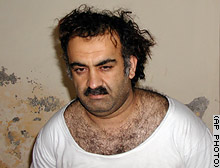
| Thanks Bambi. You wanted a circus, you're getting a circus. |
While the five men wanted to plead guilty in a military commission earlier this year to hasten their executions, sources now say that the detainees favor participating in a full-scale federal trial to air their grievances and expose their treatment while held by the CIA at secret prisons. The sources, who cautioned that the detainees' final decision remains uncertain, spoke on the condition of anonymity because all communications with high-value detainees are presumptively classified.
| One hopes most sincerely the meetings are also presumptively and thoroughly bugged. One is, however, not sanguine. |
The five accused have held two all-day meetings at Guantanamo Bay since Attorney General Eric H. Holder Jr. said they would face federal criminal prosecution, according to Joseph DellaVedova, a spokesman for the Office of Military Commissions. DellaVedova said they break only for meals and prayers during the get-togethers. The military has also provided the men with computers in their cells at Guantanamo Bay to work on their defense.
It is unclear when the men will be transferred to New York. The Obama administration has yet to file a 45-day classified notice with Congress that it intends to move the prisoners into the United States, according to Dean Boyd, a Justice Department spokesman. That suggests that their initial appearance in court in Manhattan will not come before February; the trial isn't expected to begin until late 2011.
A federal grand jury in New York is hearing evidence and testimony, according to a report by NBCNewYork.com, the Web site of a local station. Both the Justice Department and the U.S. attorney's office in Manhattan declined to comment on the report.
Courtroom as pulpit?
In hearings at Guantanamo Bay, the five detainees have trumpeted their role in the 9/11 attacks and broadcast their fealty to Osama bin Laden, causing some consternation among observers that the men will use their federal trial as a pulpit of sorts. Federal officials, though, say they are confident that some of the rhetorical flourishes that Mohammed, in particular, offered at Guantanamo Bay will be kept firmly in check in U.S. District Court.
"Judges in federal court have firm control over the conduct of defendants and other participants in their courtrooms, and when the 9/11 conspirators are brought to trial, I have every confidence that the presiding judge will ensure appropriate decorum," Holder said at a Senate Judiciary Committee hearing last month.
Facing trial with Mohammed are four other alleged key players in the Sept. 11 conspiracy: Ramzi Binalshibh, a Yemeni; Walid bin Attash, a Yemeni better known as Khallad; Ali Abd al-Aziz Ali, Mohammed's nephew and a Pakistani also known as Ammar al-Baluchi; and Mustafa Ahmed al-Hawsawi, a Saudi.
Among other issues being raised at Guantanamo, Mohammed and the others are discussing defense counsel, sources said. At the military tribunal, Mohammed, bin Attash and Ali represented themselves with assistance from both civilian and military lawyers. Lawyers for both Binalshibh and Hawsawi, however, had challenged the mental competence of their clients to represent themselves, and the issue had not been resolved when the Obama administration suspended proceedings at Guantanamo Bay.
The lawyer question
The issue of self-representation will have to be taken up again in federal court for all five defendants.
In New York, lawyers for defendants in death cases are usually drawn from a "capital panel," a short list of attorneys with experience in death penalty cases. Attorneys will also need security clearances to handle classified evidence that is off limits to the defendants.
The American Civil Liberties Union plans to ask the court to consider allowing some civilian lawyers from outside New York who worked at Guantanamo Bay to continue in the case. Mohammed's civilian attorneys at Guantanamo, for example, are from Idaho. They declined to comment on the issue of representation in federal court.
The sources said the five have not yet established a common position on the role of defense counsel. But, the sources said, the five are beginning to understand the harsh conditions they will face in Manhattan and that meetings with lawyers will be their only human contact apart from any interaction with their jailers.
The strategy meetings in Guantanamo will almost certainly end. Federal authorities are likely to impose "special administrative measures" on the defendants, according to Boyd.
Apart from measures already in place at Guantanamo Bay -- including bans on social visits, phone calls and access to the media -- special measures can limit access to other inmates, a privilege currently enjoyed in Cuba by high-value detainees such as the 9/11 defendants.
The attorney general can order the Bureau of Prisons to impose such conditions to protect national security and prevent the leak of classified information, according to federal guidelines.
At Guantanamo Bay, Mohammed and 15 other high-value detainees held at the top-secret Camp 7 can share recreation time with another detainee; visit a media room with movies, newspapers and electronic games; or work out in a gym, according to a Pentagon study, which recommended even more communal activities. Mohammed and the others have been told by military defense lawyers that once in New York, they will be in a sparse 23-hour-a-day lockdown with one hour of individual recreation, according to the sources.
"They are quite anxious about the new system and the new living conditions," one of the sources said. "They've been treated like rock stars compared to other detainees at Gitmo. And they know that all of that is about to change."

 Five of the men accused of planning the Sept. 11, 2001, attacks said Monday that they wanted to plead guilty to murder and war crimes but withdrew the offer when a military judge raised questions about whether it would prevent them from fulfilling their desire to receive the death penalty. "Are you saying if we plead guilty we will not be able to be sentenced to death?"
Five of the men accused of planning the Sept. 11, 2001, attacks said Monday that they wanted to plead guilty to murder and war crimes but withdrew the offer when a military judge raised questions about whether it would prevent them from fulfilling their desire to receive the death penalty. "Are you saying if we plead guilty we will not be able to be sentenced to death?"  WASHINGTON (AP) - The Pentagon is planning to charge six detainees at Guantanamo Bay for the Sept. 11 terror attacks on America and seek the death penalty. Defense Department spokesman Bryan Whitman said an announcement of the charges could come Monday.
WASHINGTON (AP) - The Pentagon is planning to charge six detainees at Guantanamo Bay for the Sept. 11 terror attacks on America and seek the death penalty. Defense Department spokesman Bryan Whitman said an announcement of the charges could come Monday.